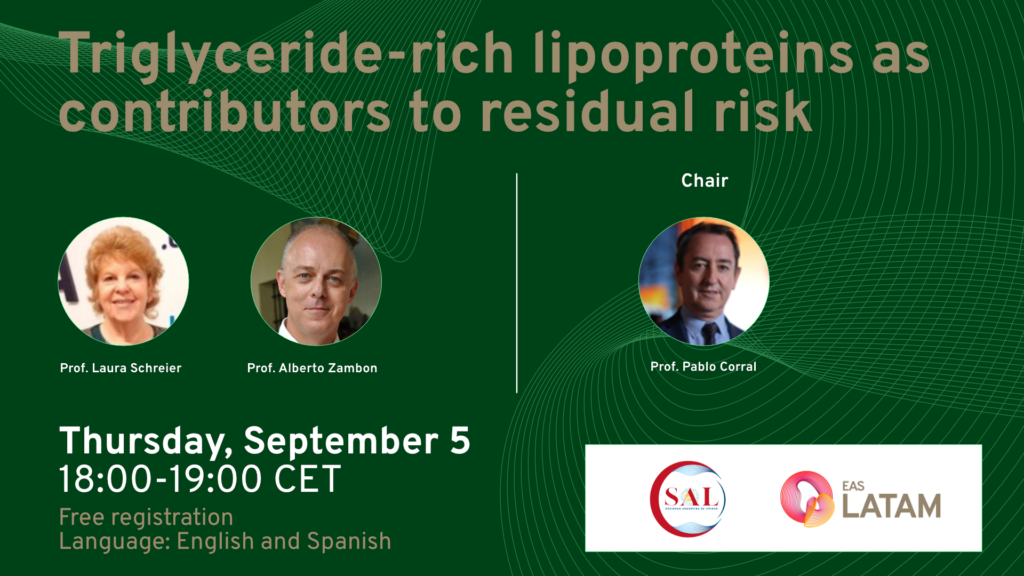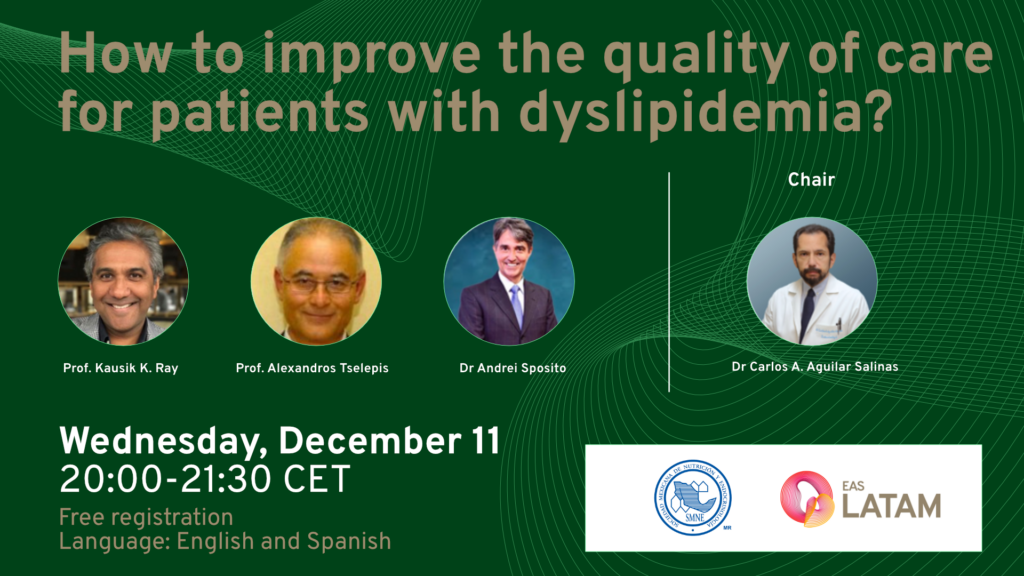Welcome to the LatAm-EAS webinar series! This series serves as a dynamic platform bridging insights and discussions between Latin America region and our society’s experts. With a focus on fostering collaboration, understanding, and innovation, our series offers a diverse range of topics explored through four engaging webinars, each presented in both English and Spanish.
Learn more about particular webinars (their programmes, speakers and chairs) by clicking on the corresponding banners:
#3 Triglyceride-rich lipoproteins as contributors to residual risk

September 5, 2024 at 18:00 CET
Language: English and Spanish
There have long been debates regarding the atherogenic role of triglyceride-rich lipoproteins (TRL) and whether mild or moderate increases should be addressed pharmacologically. While not all the mechanisms explaining the residual risk are known, TRLs are believed to play a significant role. Gaining a better understanding of the effects of TRL on the atherosclerotic process is crucial for enhancing our knowledge of how to manage hypertriglyceridemia.
Register hereAgenda:
18:00 Introduction to the webinar
18:05 Potential atherogenicity of triglyceride-rich lipoproteins, Laura Schreier
18:25 TG-rich lipoproteins: star or second advantage in the field of residual CV risk?, Alberto Zambon
18:45 Discussion and Q&A
Chair:

Pablo Corral
Internal Medicine and Lipid specialist physician; he coordinates the Lipids and Atherosclerosis Department at the ICM Institute, Mar del Plata, Argentina. He is Professor at FASTA University, School of Medicine, Pharmacology & Research Department. He is the past president of the Argentina Lipid Society.
His research interests focus on Lipids, Atherosclerosis and Cardiovascular Disease prevention, including Familial Hypercholesterolemia, Residual Risk and genetics dyslipidemias. Notably, he is member of the Red IberoAmericana de Hipercolesterolemia Familiar (IberoAmerica FH Network), Lipid and Cardiology Argentine Societies, as well as a number of expert societies including European Atherosclerosis Society (EAS).
He has published more than 50 papers in lipid field and he is an active participant of different cardiovascular meetings as speaker.
Speakers:

Laura Schreier
Full Professor at the University of Buenos Aires, Director of the Department of Clinical Biochemistry, Chief of the Laboratory of Lipids and Atherosclerosis – University of Buenos Aires, and belongs to the Institute of Pathophysiology and Clinical Biochemistry, INFIBIOC-UBA.
Laura does research in Lipids, Lipoproteins, Metabolic and Cardiovascular risk.

Alberto Zambon
Endocrinologist. Associate Professor of Medicine, Department of Medicine – University of Padua School of Medicine – Italy.
PhD in Gerontology from the University of Padua (1998). Post-Doctoral Fellow at the Division of Endocrinology, Metabolism and Nutrition, School of Medicine, University of Washington, Seattle.
#4 How to improve the quality of care for patients with dyslipidemia?

December 11, 2024 at 20:00 CET
Language: English and Spanish
Long-term adherence to lipid-lowering therapy poses one of the greatest challenges in cardiovascular prevention. The effectiveness of therapy heavily depends on the individualization of medical treatment, the identification and resolution of barriers that prevent full treatment adoption, and the implementation of best practices in medical services. Cultural issues and peculiarities of care delivery systems hinder the universal application of the same strategies.
This symposium will feature a review of the variability in the effectiveness of lipid-lowering therapy around the world. Additionally, examples of best practices implemented in Europe and Latin America will be described. All presentations will be given by highly recognized leaders in the field, representing the European Atherosclerosis Society and the EAS LATAM group.
Register hereAgenda:
20:00 Introduction to the webinar
20:05 Effectiveness of lipid-lowering therapies around the world. Kausik K. Ray
20:30 Actions to improve the quality of care for patients with dyslipidemia: The Case for Europe. Alexandros Tselepis
20:50 Actions to improve the quality of care for patients with dyslipidemia: The Case for Latin America. Andrei Sposito
21:10 Discussion and Q&A
Chair:

Carlos A. Aguilar Salinas
Founder of the Lipid Clinic and the current Head of Nutrition at the Instituto Nacional de Ciencias Medicas y Nutricion (INCMNSZ), Mexico City
Speakers:

Kausik K. Ray
Professor, BSc(hons), MBChB, MD, MPhil (Cantab), FRCP (Lon), FRCP (Ed), FACC, FESC, FAHA
Professor of Public Health at the School of Public Health, the Director of the Imperial Centre for Cardiovascular Disease Prevention and the Deputy Director of the Imperial Clinical Trial Unit, Imperial College London and a Consultant Cardiologist.

Alexandros Tselepis
Professor of Biochemistry-Clinical Chemistry University of Ioannina, Greece
Director of the Atherothrombosis Research Centre of the University of Ioannina, Greece

Andrei Sposito
MD, PhD, Director of Atherosclerosis and Vascular Biology Lab na FCM – UNICAMP, Universidade Estadual de Campinas